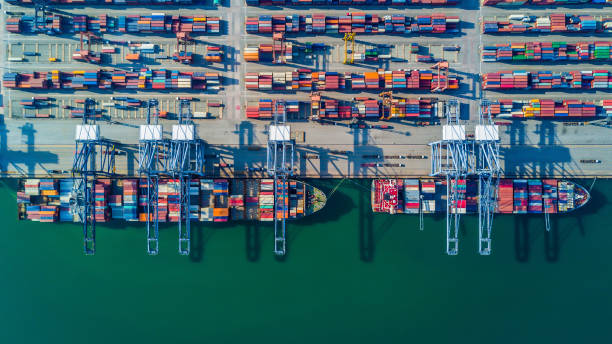Navigating a Sustainable Future: How Shipping, Ports, and Logistics Drive the Energy Transition

30 September 2023
Overview: Energy Transition (Shipping, Ports and Logistics)
In a world increasingly focused on combating climate change and transitioning to sustainable energy sources, the role of shipping, ports, and logistics cannot be overstated. These essential components of global trade and commerce are undergoing a transformation of their own, playing a crucial role in enabling the shift to sustainable energy.
The Greening of Global Trade
The shipping industry, which accounts for approximately 80% of global trade by volume, has long been a significant contributor to greenhouse gas emissions. Large cargo ships, powered by fossil fuels, have been notorious for their environmental impact. However, in recent years, there has been a growing awareness of the need to reduce emissions in this sector.
One of the most significant advancements in this regard has been the development of eco-friendly vessels. These ships are designed to be more fuel-efficient, use cleaner fuels, or even operate on alternative energy sources such as electricity or hydrogen. For instance, some companies have introduced hybrid vessels that can switch between traditional fuels and electric propulsion, allowing for reduced emissions in environmentally sensitive areas.
Furthermore, the adoption of cleaner technologies like exhaust gas cleaning systems (scrubbers) and energy-efficient ship designs has also contributed to reducing the carbon footprint of the shipping industry. These innovations not only lower emissions but also result in cost savings for ship operators in the long run.
Ports as Key Players
Ports, often referred to as the “gateways of global trade,” are essential in facilitating the transition to sustainable energy. They serve as critical points of interface between ships and land-based transportation systems, making them pivotal in the distribution of sustainable energy resources.
One of the most notable developments in this context is the electrification of port operations. Many ports around the world are investing in electrified infrastructure to support the docking and unloading of electric or hybrid vessels. This allows ships to connect to the grid and power down their engines while at port, reducing emissions and noise pollution significantly.
Moreover, ports are playing a crucial role in the handling and distribution of renewable energy resources such as wind turbines and solar panels. As renewable energy production increases, the demand for efficient logistics and transportation networks becomes paramount. Ports are strategically positioned to facilitate the transportation and export of renewable energy equipment to various parts of the world.
Logistics: The Backbone of Sustainability
The logistics industry, often less visible but equally vital, is a linchpin in the transition to sustainable energy. It encompasses the planning, coordination, and execution of the movement of goods, including renewable energy technologies, across the globe.
One of the key areas where logistics is contributing to sustainability is in the optimization of supply chains. Companies are increasingly adopting environmentally conscious supply chain practices, including the use of electric or hybrid delivery vehicles, improved route planning to reduce fuel consumption, and the consolidation of shipments to reduce overall transportation emissions.
Additionally, innovations in logistics technology are enabling greater transparency and efficiency. Blockchain, for example, is being used to create transparent and secure supply chain networks for renewable energy products, ensuring that they are sourced and transported sustainably.
The Interconnectedness of Sustainability
It’s important to recognize that shipping, ports, and logistics are interconnected components of a larger sustainability ecosystem. Sustainable energy production relies on the timely and efficient transportation of renewable energy equipment, which is made possible by innovative logistics solutions and eco-friendly shipping practices.
The integration of these sectors with renewable energy production extends beyond transportation and includes various other aspects such as the recycling and disposal of old energy infrastructure, the development of sustainable packaging materials, and the reduction of waste generated throughout the supply chain.
Challenges and Opportunities
While significant progress has been made, challenges remain on the path to a fully sustainable shipping, ports, and logistics industry. The transition to alternative fuels and technologies, for instance, requires substantial investments and infrastructure upgrades. Additionally, global standards and regulations for emissions reduction need to be harmonized to ensure a level playing field for all stakeholders.
However, these challenges also present opportunities for innovation and collaboration. Governments, industries, and academia are coming together to develop and implement sustainable practices and technologies. Initiatives like the International Maritime Organization’s (IMO) targets for reducing greenhouse gas emissions from shipping and the electrification of ports demonstrate the commitment of stakeholders to creating a more sustainable future.
Conclusion
In the grand scheme of transitioning to sustainable energy, the roles of shipping, ports, and logistics are often overlooked, but they are undeniably essential. These sectors are not only reducing their own environmental footprint but are also enabling the global shift to sustainable energy sources. As the world continues to grapple with climate change, it is crucial to recognize and celebrate the transformative efforts of these industries in building a more sustainable future for us all. The synergy between sustainable energy and the logistics of its production and distribution is a testament to the power of innovation and collaboration in addressing the most pressing challenges of our time.
Click here to join our Telegram chanel
You will get information, news, and support related to Merchant Navy.
